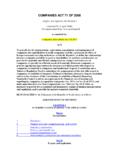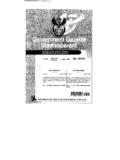Transcription of ! TheStandard!of!Directors!Conduct.! ! Unpacking!section ...
1 The Standard of Directors Conduct. Unpacking section 76 of the companies Act 71 of 2008 By Ian Cox Section 76 is a play in four acts. The underlying theme running through all four acts is that section 76 does not exclude the common law fiduciary duties owed by a person occupying a position of trust in relation to a company. Act One: The definition of a director. The fiduciary duty owed to a company in common law is not limited to a director.
2 The Supreme Court of Appeal ruled in Philips v Fieldstone Africa (Pty) Ltd [2004] 2 All SA 150 that the standard of conduct expected of a director extends to anyone who occupies a position of trust in relationship to the company. Section 76(1) states that for the purposes of this section the term director includes an alternate director, a prescribed officer and members of board committees including an audit committee.
3 This definition is broader in its scope than the definition of a director in section 75(1) (disclosures of personal financial interests) which does not include members of an audit committee. The common law rule described in Fieldstone thus remains intact. Senior managers who are not directors as defined and others who fall outside the scope of that definition may still owe a fiduciary duty to the company on account of the fact that they occupy a position of trust.
4 It is important to note that this position of trust is not the same as the obligation of fealty or loyalty that arises in employment law. A discretionary exercise of power over the company is an inherent feature of a position of trust. This is not a prerequisite of the obligation of loyalty that arises in an employment relationship. Act Two: Section 76(2) and the duty to avoid conflicts of interests.
5 Section 76(2) is considerably more complicated. It states: A director of a company must: (a) not use the position of director, or any information obtained while acting in the capacity of a director: (i) to gain an advantage for the director, or for another person other than the company or a wholly- owned subsidiary of the company; or (ii) to knowingly cause harm to the company or a subsidiary of the company.
6 And (b) communicate to the board at the earliest practicable opportunity any information that comes to the director s attention, unless the director: (i) reasonably believes that the information is immaterial to the company; or generally available to the public, or known to the other directors; or (ii) is bound not to disclose that information by a legal or ethical obligation of confidentiality. 2 This section needs to be read in conjunction with section 75.
7 Interpreting this section is a bit like decoding a Rubik s Cube. In my view it goes like this: 1. The common law duty as pithily expressed by the Honourable Mr Justice Innes CJ in Robinson v Randfontein Estates Gold Mining 1921 AD 168: Where one man stands to another in a position of confidence involving a duty to protect the interests of that other, he is not allowed to make a secret profit at the other s expense or place himself in a position where his interests conflict with his duty.
8 Remains unchanged outside the scope of section 75 and the way that section deals with the disclosure of personal financial interests. 2. Those who occupy a position of trust in relation to a company but who are not directors as defined in section 75(1) are not bound by section 75 and are not therefore obliged to disclose conflicts of interest even if these involve a personal financial interest.
9 They are nonetheless obliged at common law to avoid conflicts of interests in their dealings with or on behalf of the company. Secret dealings in contravention of this obligation are treated as fraudulent and any decision or transaction that takes place as a result of such dealings may be declared void by the company. This rule is strictly applied and may not be waived. However it does not apply in cases where the shareholders permit non compliance provided that this consent is an informed one.
10 Furthermore shareholders may later condone non compliance and ratify any decisions or transactions that might otherwise be voidable. Thus although members of an audit committee may not be subject to the duty to disclose set out in section 75 they are still subject to the common law duty described above. The same applies to senior managers and indeed any other person who is not a director as defined but who nonetheless occupies a position of trust and thus owe a fiduciary duty to the company.







